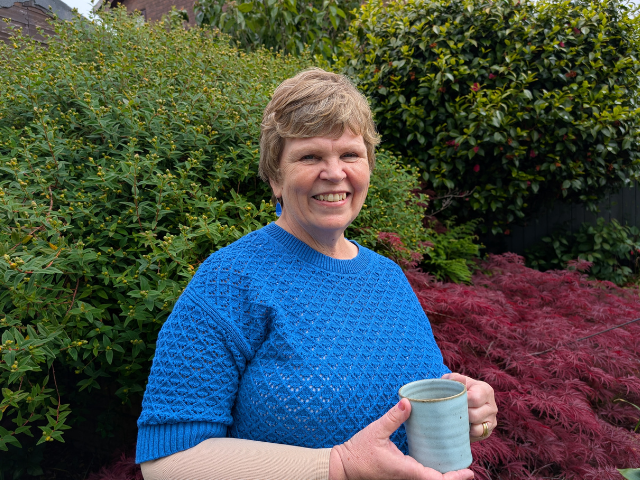
Barry woman becomes first patient in Wales to receive life-prolonging drug treatment for terminal breast cancer
2 June
A woman from Barry who was diagnosed with terminal breast cancer has become the first patient in Wales to receive a life-prolonging drug treatment following a groundbreaking clinical trial supported by Health and Care Research Wales.
Gwen Buchan was first diagnosed with primary breast cancer 16 years ago and had surgery followed by chemotherapy, radiotherapy and hormone treatment. But last April she received the news that she had developed secondary cancer five weeks before her son’s wedding, which she and her husband decided not to reveal in the meantime.
With her first line of treatment no longer working after just four months, a ‘devastated’ Gwen struggled to process the news – until she heard about a new treatment, capivasertib, becoming available on the NHS while she was visiting family in Scotland.
Capivasertib is a tablet which, when used in combination with standard hormone treatment, can slow the progression of incurable breast cancer, potentially extending eligible patients’ lifespan by months or even years. It was tested in a clinical trial, FAKTION, led by Velindre Cancer Centre in Cardiff in partnership with AstraZeneca and Cardiff University, with infrastructure support from Health and Care Research Wales.
Last month, Capivasertib was approved for use on NHS patients in England and has now been licensed for use in Wales.
Speaking with BBC Wales, Gwen said: “I really didn't know much about it, until my oncologist mentioned that there were new treatments becoming available, but it wasn't really until maybe four weeks ago that I found out there was a good chance I could have it - if I had a specific mutation, which I do have - and I couldn't quite believe it.
“I'm hoping that it extends my life, I'm life limited. It was disappointing when my first line of treatment went down so early. I've met a lot of people who were five years down the line, still on that first line of treatment, so to know that I was four months in and it was no longer working was devastating.
“I think you’ve just got to keep hope in your heart
"I don't know what’s going to happen next year, I'm further down the line and the way I cope with this is by thinking that today is a good day, because I'm here.
“If you actually ask me how I feel, I feel pretty good. It might all sound horrific, but the reality is I'm not in a lot of pain.
“That's why I concentrate on every single day because I'm not going to worry about how I'm going to feel in six months time, I’m going to think how do I feel today? I feel pretty good. Do I want to go and do something? Yes, I do.”
Professor Rob Jones, who was Chief Investigator of the FAKTION trial, added: “It’s immensely satisfying to see how a clinical trial that started out here in Wales has led to the licensing of capivasertib for NHS patients in Wales.
“Patients who have been diagnosed with breast cancer that has spread most often cannot be cured, and we are looking at trying to extend lives, but it’s the quality of life as much as the quantity of life that’s important for patients.
“This is a great success story for Wales.
"It can’t be underlined how rare it is that new first in class, first clinical indication drugs are approved by NICE in the UK and globally it only happens about once every few years with breast cancer, and that involves trials done all over the world, so to have that achieved by Welsh led research is really quite significant.”
Dr Nicola Williams, National Director of Support and Delivery at Health and Care Research Wales, added: “The FAKTION trial is a shining example of how Welsh-led research, in collaboration with hospitals all over the UK, has been able to make a difference to patients’ lives.
“A breast cancer diagnosis can be devastating, and one in seven women will be diagnosed with the disease in their lifetime. This diagnosis is even more painful if you’re told your cancer is incurable. Thanks to the trial and the licensing of Capivasertib, when used alongside a standard hormonal therapy, patients like Gwen now have the potential to receive a very significant extension in their lifespan and improved quality of life.
“We are proud of our researchers and partners in Wales , including the Centre for Trials Research, Velindre University NHS Trust and the Wales Cancer Research Centre, for playing such a pivotal role in the field of cancer research.”
Keep up to date with studies like FAKTION happening across Wales by signing up to the Health and Care Research Wales newsletter.